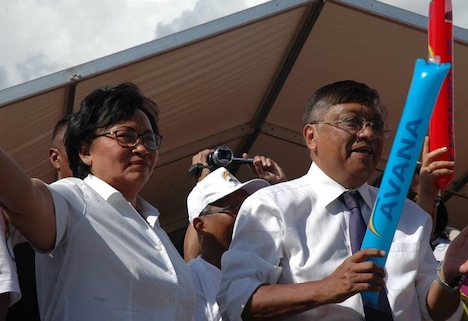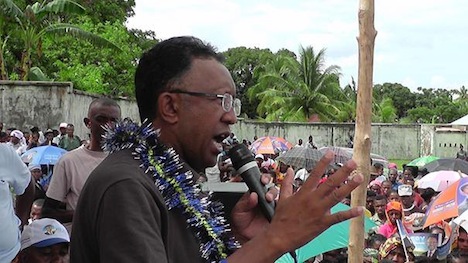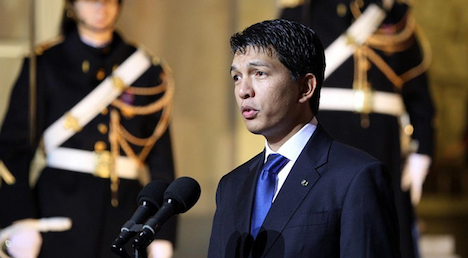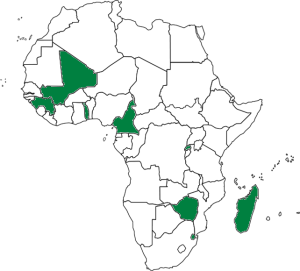
Though the main actors in Malagasy politics have all been barred from running in Madagascar’s presidential election, they still found a way to overshadow the actual candidates in the country’s October 25 election.
Results are still trickling in four days after the vote, but with just over 25% of all votes counted, it seems almost certain that the race will head to a December 20 runoff between the top two candidates.
That the vote actually went forward four years after a political coup marks significant progress for Madagascar, which has been trapped in a political and economic crisis since 2009. With a new constitution in place, however, the new president will hopefully close the door on the turmoil that began with the March 2009 coup that brought opposition leader Andry Rajoelina, then the mayor of Madagascar’s capital of Antananarivo, to power. Rajoelina replaced Marc Ravalomanana, first elected president in 2002 and reelected overwhelmingly in 2006, following widespread riots over economic conditions, sparking concern from throughout the world, including donor countries like France and the United States.
The country has been essentially transitioning toward last weekend’s presidential election ever since. Finally scheduled for July 24, the election was postponed to August 23 and, again, to October after repeated delays and clashes among Madagascar’s constitutional court, the electoral commission and the Rajoelina administration.
Last year, the European Union and the African Union brokered a deal whereby both Rajoelina and Ravalomanana agreed not to recontest the presidency, which appeared to clear the way for 2013 elections. But when former first lady Lalao Ravalomanana declared her own candidacy, Rajoelina declared his candidacy as well, arguing that Ravalomanana’s wife was a sly stand-in for the former president. For good measure, former president Didier Ratsiraka, who brings an additional set of baggage to Malagasy politics, threw his hat in the ring as well.
Over the summer, however, Madagascar’s electoral court banned all three candidates — Rajoelina, Ravalomanana and Ratsiraka — thereby clearing the way for an entirely new administration relatively untainted by the personal failures of the three men who have governed Madagascar for all but five of the past 38 years.
Among the 33 candidates in the first round, two candidates seem poised to face off in the runoff, and unsurprisingly, they are the two candidates who are supported by both Rajoelina and Ravalomanana.
The first is Jean Louis Robinson (pictured above with Lalao Ravalomanana), a physician who previously served as Ravalomanana’s health minister, who leads with 26.32% of the current vote total. He has benefitted from the full support of both Ravalomanana and his spouse during the campaign, and his campaign platform involves returning to an updated Madagascar Action Plan (MAP) that Ravalomanana tried to implement in the mid-2000s.
The second is Hery Rajaonarimampianina, Rajoelina’s finance minister between 2009 and 2013, who is in second place with 15.16%. Though Rajoelina, as sitting president, remains neutral in the race, it’s clear that he is supporting Rajaonarimampianina. Rajaonarimampianina received a masters’ degree in finance and accounting in Québec in the 1980s, served as director of the National Business Institute in the early 1990s, and worked in the private sector in the 2000s as an auditor and accountant.
Both candidates have promised to take action to boost employment and reduce poverty. Madagascar, a former French colony with a population of around 22 million, suffers from low growth after years of a relatively planned, socialist economy that flatlined after the 2009 coup, despite Rajoelina’s pledge four years ago to restore democracy. While the eventual winner of Madagascar’s presidency can look forward to a boost from the resumption of international aid from the European Union and the United States, he will face the need to implement serious and fundamental structural reforms if the Malagasy economy is to become truly competitive globally.
No other candidate is currently polling more than 10% of the vote, but the next five candidates include a who’s who of Malagasy political figures, including other politicians who have held roles in Rajoelina’s government over the past four years:
Continue reading Madagascar holds long-awaited election, prepares for December runoff →
![]()




